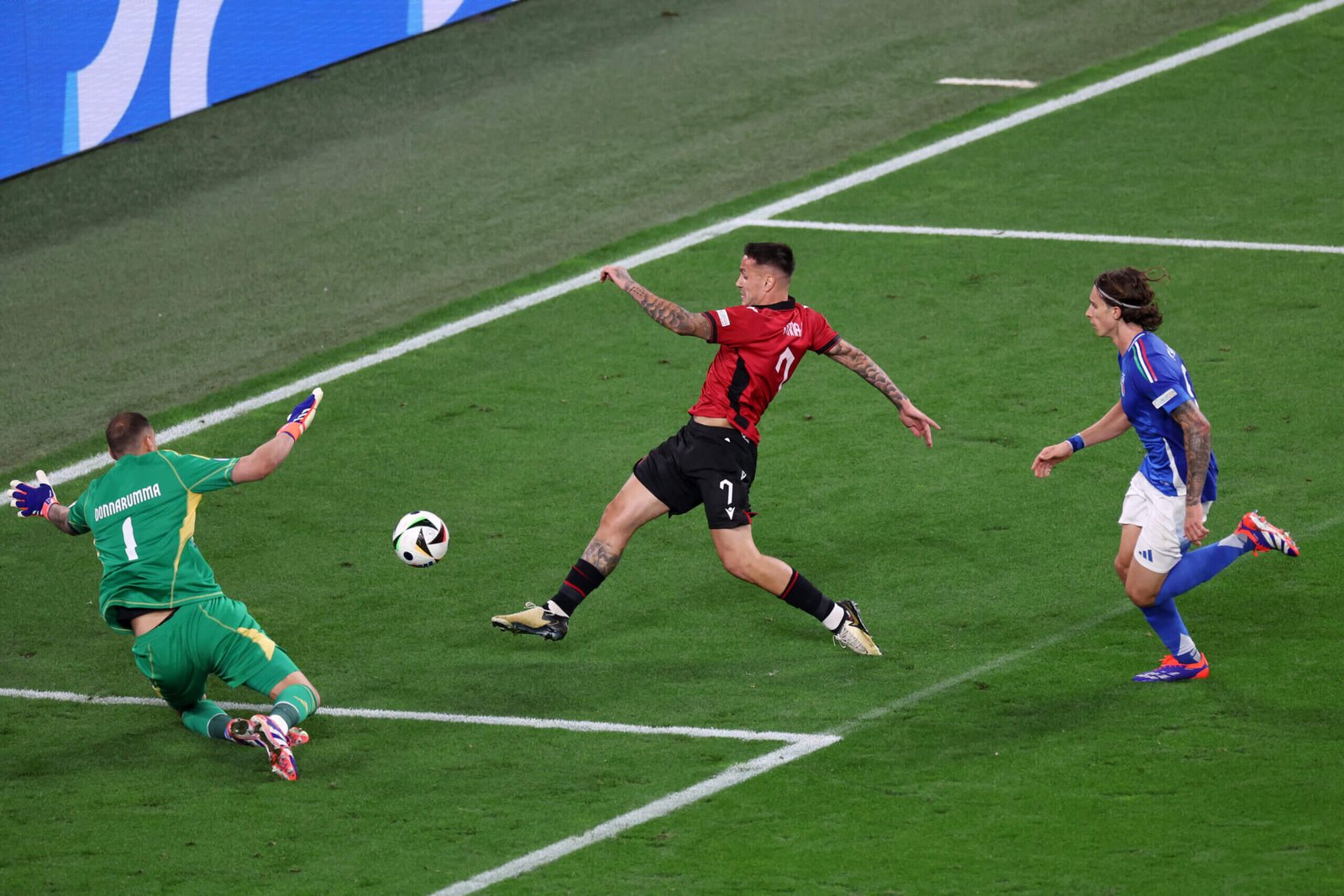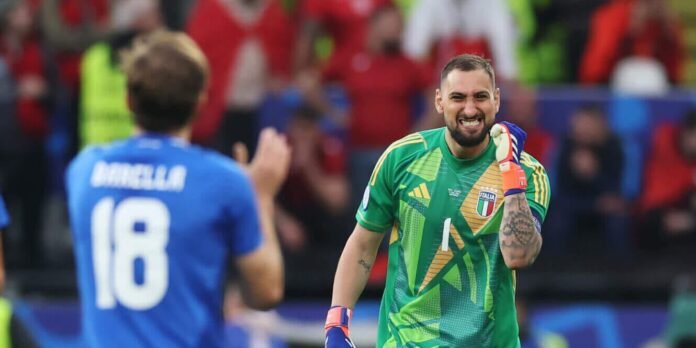Federico Chiesa had a flashback. When Italy conceded the fastest goal in the history of the Euros against Albania, it took him back to Wembley when his team went behind to England. The occasion was different, a tournament opener rather than the final three years ago, but the atmosphere was as scintillatingly hostile. Dortmund felt like Tirana. Three quarters of Signal Iduna Park was rowdy red, full of Albanians draped in flags and wearing the qeleshe, a white brimless felt skull cap.
“It was a very negative situation,” Chiesa said. “We immediately overturned it. We took it as a positive shock to the system.”
Doubt could have set in. Alessandro Bastoni’s centre-back partner Riccardo Calafiori had not been capped until the warm-up games. “There was a lot of emotion,” he said. After all, this was only his second start in Azzurro.
Nicolo Barella was passed fit after spending the last fortnight recovering from a thigh strain. It was a pleasant surprise to see him in the line-up. But questions lingered about the level he might be able to play at. “Only our brand of football can save us,” Spalletti said. A brand of football he has intermittently tried to implement these past nine months.
“We’d like to do something that isn’t rigid, that’s quite free,” he philosophised. “Give the players and their talent freedom of expression while being an organised team at the same time. The more unpredictability there is, the more a surprise it becomes for our opponents.” After gathering themselves here in Westfalen, Italy dominated. The peaks at times resembled the pointy yellow girders that loom large over this old arena. They were so high one reporter after the game asked Spalletti straight up: Can you win the Euros?
“Everyone always says the same thing. The executives at the Federcalcio even do it now: ‘Mister, the important thing is to win’. It’s been that way since I started coaching kids. ‘The important thing is to win’. I disagree. The important thing is to play well. That’s the only path.” It’s more trodden than ever in Italy. Ever since 2012 and Cesare Prandelli’s Tik-Italia national team, Italy have played counter cultural football to the extent it is no longer counter culture. Roberto Mancini won the Euros in 2021 by the grace of Marco Verratti and Jorginho’s strengths in possession, Leonardo Spinazzola’s propulsion and Federico Chiesa’s punchy one-v-ones. Italy pressed with the intensity of a blue flame.
It is premature to claim that the 2024 vintage is an evolution. But Italy completed 750 passes against Albania, including 186 in the final third. Jorginho directed, instructing the defenders and midfielders around him where to pass and move. He was one of three Italy players to end the game as a centurion with more than 100 passes made.
Bastoni’s equaliser was a reminder of how well Italy weaponised set-pieces three years ago. Barella’s winner was pure uncut Tardelli. At times Italy’s play was mesmerising to watch, particularly as Calafiori strode forward and Federico Dimarco and Chiesa provided the width while Davide Frattesi bounced off Gianluca Scamacca. Although, Spalletti, always a hard taskmaster, found some of it narcissistic.
“We liked ourselves too much,” he said. “I saw a lot of good things but they have to lead somewhere. They can’t be an end in themselves.”
Spalletti wanted more balls in behind. Italy proved adept at playing through Albania’s press and at finding the free man. But rather than strike and play another defence-splitting pass, Italy stood on the ball, passed backwards and re-started. Even a long ball over the top every now again isn’t so bad, Spalletti opined. In doing so he resembled a three-starred Michelin chef who occasionally craves a burger. “We’ll need to be more clinical in the upcoming games,” Bastoni admitted. Italy’s style of football must save them, rather than goalkeeper Gigio Donnarumma who came up big in stoppage time when his armpit denied Rey Manaj a goal and Albania a point. “A draw would have been a wrong result,” Chiesa concluded.

(Kevin C. Cox/Getty Images)
The Juventus winger was back on the right, reprising the role he played at the last Euros. UEFA awarded Chiesa the man of the match award but the plaudits instead should have gone to Spalletti. On the eve of the game he remarked upon how he has heard the same thing over and over again about how little time he has to prepare the players. Spalletti instead insisted he couldn’t use it as an excuse because the Azzurri have taken on board a lot of what he wants in no time at all. Spain represent an altogether different proposition from Albania. The Tik-Italia vibes are even stronger than in 2012. Prandelli, Mancini and Spalletti have, over the last decade, brought out Italy’s real identity. It’s less catenaccio. More dolce vita and The Great Beauty. This is Italy.
(Lars Baron/Getty Images)
Read the full article here


